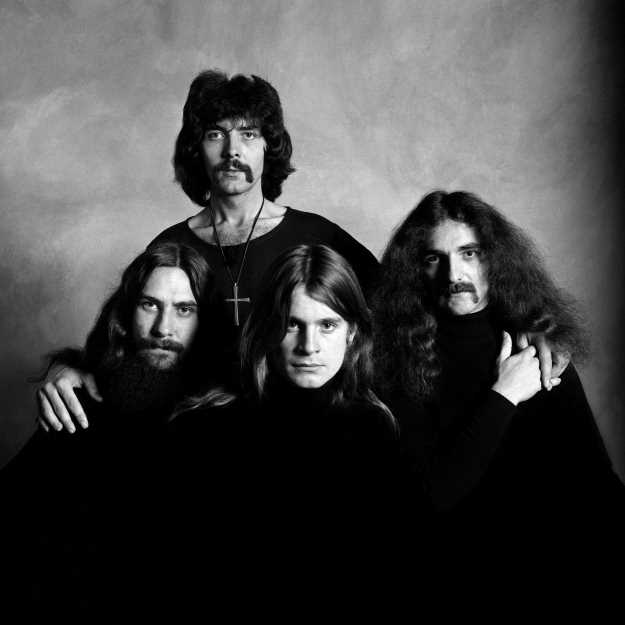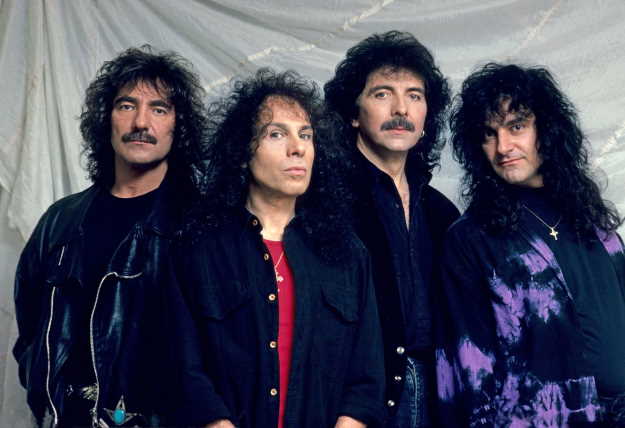|
Taken from cleveland.com (Mar 17, 2021)
Geezer Butler talks Black Sabbath, 'bucketloads of cocaine,' Dio, grandkids & more
by Gary Graff, special to cleveland.com

Black Sabbath, clockwise from left: Bill Ward, Tony Iommi, Geezer Butler and Ozzy Osbourne. (Photo: Duffy) |
CLEVELAND, Ohio -- Black Sabbath declared "The End" back in February 2017, when the iconic heavy rock troupe played final shows in its home town of Birmingham, England.
But while gone, the group is hardly forgotten.
During the past month, in fact, the Rock and Roll Hall of Fame outfit has remembered some key moments of its past. Black Sabbath has released new deluxe editions of 1972's "Vol.4", the first album the band produced itself and recorded outside of England, and of "Heaven and Hell" (1980) and "Mob Rules" (1981), which marked the arrival of Ronnie James Dio for a short stint replacing Ozzy Osbourne -- later reprised during the late 2000s under the moniker Heaven & Hell. All feature unreleased demos, alternative versions and live tracks, reminders of how potent, and resilient, Black Sabbath has been since forming in 1968.
"I think it's just to keep the name going, I suppose," bassist Geezer Butler, 71, says of the reissues -- as if it would ever be forgotten. But rest assured he remembers plenty about all of them...
"Vol. 4" is a lot of fans' favorite Black Sabbath album. Where does it fit for you?
Butler: Well, it was different because we didn't have a producer on that album. We went to Los Angeles, so the weather was a lot better than we were used to in England. And we had a really good time living together, 'cause it was the first time we actually lived together to write and make an album. I think there are things on there that wouldn't have happened if we hadn't all been together like that -- like "Changes," which started because Tony was playing a piano at the house we were staying in and Ozzy came up with the melody and I came up with the lyrics. That wouldn't have happened any other way.
One shudders to imagine what the four of you living together in 1972 must have been like.
Butler: It was mental. Completely mental! We used to have bucketloads of cocaine there, and we had this big bowl in the middle of the table, full of cocaine. One day Ozzy noticed this button below one of the windows; He kept pressing it, "I wonder what this does?" The next thing, the police turned up -- it was a panic button. And there was us with this great big bowl of cocaine in the middle. So, we dumped all the cocaine down the toilet and ran upstairs to get rid of our own stashes. The coppers went, "What's the problem?" "Oh, nothing..." "OK, see ya..." And we'd dumped about five grams of cocaine down the bog!
Jump ahead eight years -- Ozzy's gone, Dio joins the band. That's a pretty dramatic time for you.
Geezer: Yeah, having to replace Ozzy was a massive task. But the songs were so good, even though Ozzy didn't like them, and the record company loved it. Tony met (Dio) at a party and invited him over for a jam -- nothing to do with Sabbath at that time, just a jam. We tried the songs again with Ronnie and he did an incredible job on them. The manager at the time didn't want Ronnie in the band -- he said he was too little! (laughs) He used to call him "the dwarf" and all this stuff. And we said, "That's ridiculous. He's got a great voice, his songwriting's brilliant, he's doing great with the band and that's it. We're keeping him."
What else did Dio bring to the band besides his voice?
Butler: He brought massive enthusiasm back to the band. We were on our last legs kind of thing, after Ozzy went. We were almost thinking about breaking up. But Ronnie brought incredible enthusiasm with him. He could play guitar and bass and put over his ideas instrumentally as well as vocally. He was brilliant to write with, too.
Legend has it that Dio picked up the devil's horn hand sign, which became his trademark, from you.
Butler: Well, I used to do that (sign) to the audience when we were playing "Black Sabbath," the song. There's pictures of me doing it, I know. But I didn't invent it; It was something Aleister Crowley used to do...So when we went on tour with Ronnie, he was like, "Everybody's flashing the peace sign at me. But that's an Ozzy thing. What can I do back to them?" I showed him the (devil's horn) sign and he did it and it just kind of took off from there, you know?
That initial incarnation of the Dio band only lasted three years and two albums. Could anything have kept it together for longer?
Butler: No, because after "The Mob Rules," towards the end of that tour we were having problems with...Egos were getting a bit bigger and stuff like that. Ronnie wanted to do a solo album, so we just sort of sputtered out. When we did the tours as the band Heaven & Hell, and "The Devil You Know" album (in 2009), it was a good end to that era. Unfortunately, it had to end with Ronnie passing away."
Do you ever allow yourself to bask in the legacy of Black Sabbath?
Butler: Yeah, sometimes. At the moment I'm writing a memoir. I started out because when my parents died I always wished I'd asked them a lot more things than I knew about. I don't really know much about my mum and dad, 'cause they were always just there. So, I started writing a memoir for my grandkids to read, and that's been fun going through stuff -- old times and growing up in Birmingham and all that. I'm right in the middle of doing that at the moment.
So, what's your read on why the band and the music has endured as it has?
Butler: I think it's because Tony's riffs were absolutely amazing, and I think every guitar player tried to play "Iron Man" or "War Pigs" or "Paranoid;" I've had so many people cover the years come up to me to say, "The first thing I ever learned on guitar was "Iron Man." It's not mind-boggling science or anything, the stuff we were doing. The first three albums were, like, live in the studio. It's just raw. Because it's so live-sounding, it doesn't date. And the subject matter was a lot different to what everyone else was writing. So, we had our own integrity kind of thing.

Dio-era Black Sabbath, from left: Geezer Butler, Ronnie James Dio, Tony Iommi and Vinnie Appice. (Photo: Mark Weiss) |
And there was a great image and kind of mystery to the group as well, which had some appeal.
Butler: But it wasn't to do with Satanism or anything like that -- in fact, "Black Sabbath," the first song on the (first) album is a warning against Satanism and getting involved in black magic and that kind of thing, which was a bit of a thing at the end of the '60s, early '70s in England. I think the name, Black Sabbath, people associated with black magic and all that kind of crap, whereas the lyrics were about the evils of the world -- pollution and war and that kind of thing.
So, is it really the end after the last tour, or has the pandemic got you guys thinking about maybe doing it again?
Butler: Nope, definitely not. We went out on top -- why ruin it? We're all old -- really old. I don't think we could last a tour these days. (laughs) Tony has had his cancer; He's in remission but he doesn't want to chance going out on the road. God knows what Ozzy's doing. He was waiting to do his final tour for the past three years. I don't know if he'll ever go out on the road again. So no, Sabbath, it's definitely the end for us.
Is there more music from you ahead? You've only put out a couple of singles so far with Deadland Ritual, your band with Steve Stevens, Matt Sorum and Frankie Perez.
Butler: I might be. I've got so much stuff written -- like 90 different riffs and ideas to go through. But it's just getting the right time and the right people to do it. If I'm not into it, it's pointless forcing anything. I'm loving enjoying the time now to see my grandkids and everything these days. It's a big thing to tear myself away from the family, so we'll see what happens.
|